Publish Date - May 1st, 2022
|Last Modified - September 3rd, 2023
SQL (structured query language) is probably the most popular database organizational language in the world. Whether it’s saving your work on a website, writing tickets on your Jira board at work or deleting old account files from a video game – databases are at the foundation of many IT and Internet of things (IoT) systems in all facets of society. With all its popularity, it’s no wonder massive open online course providers like Udemy and Coursera offer thousands of comprehensive online SQL courses. I personally have learned many of my SQL database skills from the Udemy SQL courses provided!
Most software engineer jobs require a strong foundation of SQL, or a related database language due to the need of being to store data and then subsequently call upon it when needed.
However, business jobs like business systems analysts (BSAs), product managers and even general marketing or reporting analysts, may need to call upon SQL as a skill to extract, load and transform (ETL) large data sets. Data is the lifeblood of everything we do, and being able to organize and manipulate is a sought after skill!
According to Statista and over 87k+ respondents, almost 50% of them said they used SQL (or an SQL equivalent) on a regular basis. Therefore, there’s clearly an importance to have these languages available.
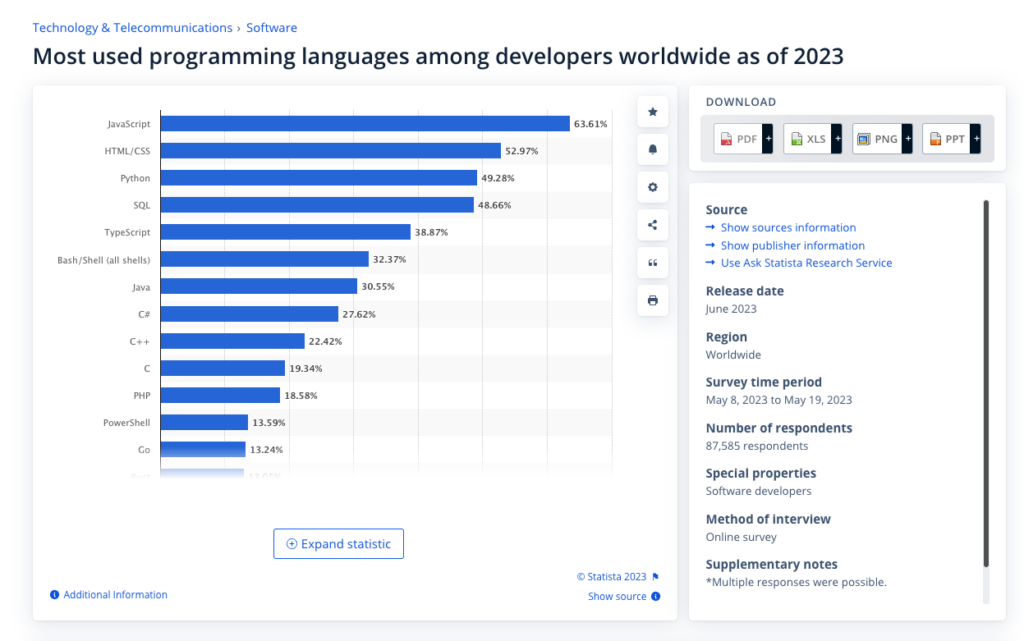
Note: There are affiliate links below to Udemy and other parties that I may receive commissions from. However, I highly recommend these products due to the fact that I’ve audited or taken them before. Please click through and support my website so that I don’t need to run Ads :).
My experience with Udemy SQL courses
Like me, most business individuals needed to self learn these skills. The best place to do that was on massive online open courses (MOOCs) since you could learn at your own pace, have easy access to large datasets and learn real life use cases that are applicable to the workforce.
This is where Udemy SQL courses can come in handy. From my experience and as a lifetime learner, I’ve completed and started at least 6 individual SQL courses.
I’ve noticed a trend among the SQL courses that I’ve either done myself or audited on Udemy:
- They’re shorter than your average tutorial courses (6 – 10) hours, which is a good thing.
- They normally have excellent sample datasets which some MOOCs struggle with.
- A lot of the more sticky SQL subjects (Triggers, Procedures, Function building) are well documented and usually in-depth.
- The course creators try to steep the course from a practical point of view, instead of learning theory. This means you learn skills that can help you in the real world.
- There are tons of courses that cover database design and architecture, data analysis and big data. All extremely big topics in our modern age.
- You get lifetime access. This is good especially with technologies evolving so quickly.
Ultimately, the purpose of me creating this guide is to provide you with the best Udemy courses about SQL. I didn’t limit this guide to just normal run of the mill SQL. I also include courses for NoSQL, MySQL, Oracle SQL and Postgresql so that you can grow your own skills and get that job that you’ve always wanted :).
The 7 Best SQL Udemy Courses for 2023
| Course | Ratings | Highlights | Frameworks |
| Complete SQL bootcamp – Zero to Hero by Jose Portilla | 4.7 / 5 – 183k+ Ratings | Postgresql, PGadmin, Python |
| Ultimate MySQL bootcamp – Beginner to Expert by Colt Steele and Ian Schoonover | 4.7 / 5 – 84k+ Ratings | MySQL, GoormIDE, PHP, Node.js, HTML/CSS, npm, EJS. |
| MySQL for Data analytics and BI by 365 Careerss | 4.6 / 5 – 52k+ Ratings | MySQL, MySQL workbench, Tableau |
| SQL for Data science w/ BigQuery by Chris Levy | 4.6 / 5 – +2k Ratings | SQL, BigQuery, Google data studio, GCP. |
| SQL and PostgreSQL – Developer Guide by Stephen Grinder | 4.7 / 5 – 7.5k+ Ratings | Postgresql, PGadmin, Python, Parallel Testing, |
| MongoDB Guide (2022) by Maximilian Schwarzmuller | 4.7 / 5 – 22k+ Ratings | JSON, BSON, NoSQL, Stitch, MongoDB Atlas |
| Best Oracle SQL course – Oracle Bootcamp by Oracle Master Training | 4.7 / 5 – ~18k ratings | Oracle SQL (1Z0-071 (OCA)) prep, Functions, Subqueries, Constraints, Views, Oracle synonyms and sequences, Data dictionaries |
Note, as stated – I’ve done or started over 6 SQL courses (two of them being in this list) and audited the other courses (reviewed key portions of the course, exercises and projects). Here are two certifications from the MySQL data analytics course (business intelligence) and another from the Best SQL bootcamp.
I’m currently in the process of doing PostgreSQL (Good if you are learning python) and MongoDB good if you’re working with JavaScript applications.
Overall Best SQL Course on Udemy – Jose Portilla’s Zero to Hero SQL Bootcamp
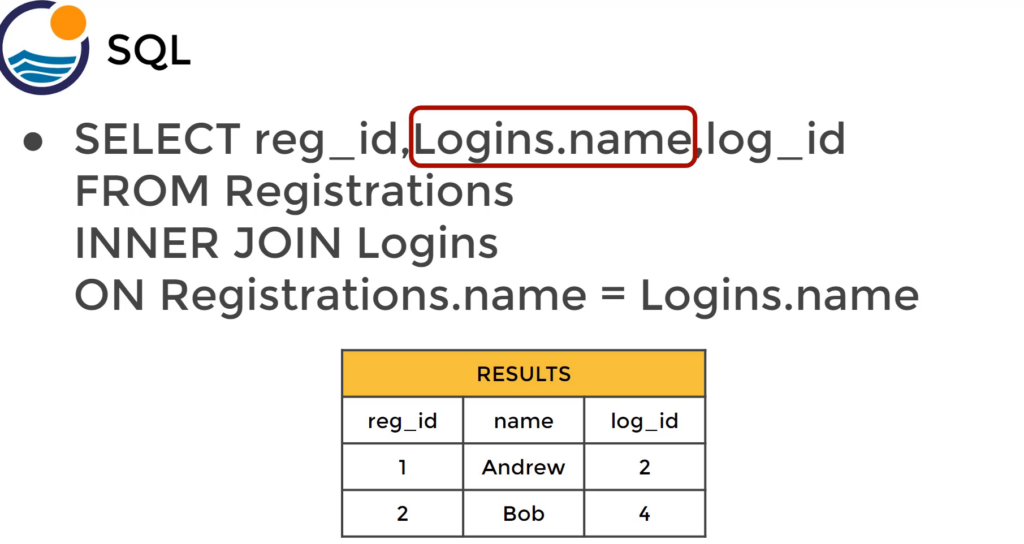
Overview:
This 9 hour course has a variety of things that make it a top notch SQL bootcamp.
- A ramp up from zero-to-hero. The ramp-up is fairly slow, but it’s an easy to understand / methodological approach to learning a coding language.
- After every section there’s a challenge, here’s an example of the Chapter two challenge. It may seem easy, but you end up building the muscle memory you need.
- You cover a good set of advanced concepts like joins (including union), mathematical operators, subqueries, procedures and conditionals.
- There’s a small project at the end of course, with large 30 minute assessment tests after every three chapters.
- There’s also some python at the end mixed in with your querying so that you can get a taste for the data science or machine learning side of the SQL.
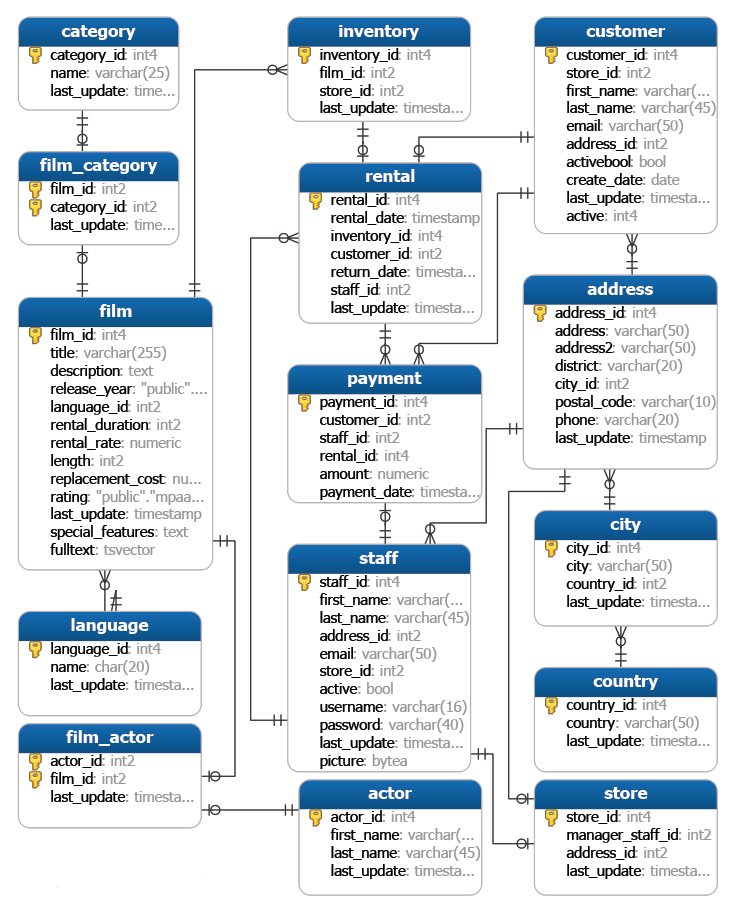
Above is the schema of the database that you will be working with, this is a complex database!
Pros:
- Great compact course, not too long and not too short.
- Great workbook material and data resources (practice database is a good size)
- Awesome ramp-up for the course (a true zero to hero)
- Good test, quizzes and exercises
- Jose is very well-spoken (in english) and articulates himself quite well when teaching
- The section pacing was perfect – “group by” and SQL fundamentals (SELECT, COUNT etc..) are fairly easy concepts which can be covered in two hours. Whereas having JOINS and UNIONS with their own 1.5 hour section each, allows you to get the practice you need.
Cons:
- While there was good coverage on create, read, update, delete (CRUD) queries, I think there could have been more theoretical overview on how DBs work and what SQL does (only a small 8 minute session).
- They cover procedures and JOINs, but no user-defined functions? User-defined functions are an extremely important concept for SQL. The ability to pass and store variables is an extremely important skill to learn for SQL.
- There was also nothing on views or triggers as well.
- It would have been nice for Jose to cover MySQL, Microsoft SQL server (MS SQL) or even Oracle since the syntax is different, everything is Postgresql based.
Who this course is for
- Anyone who wants to learn SQL from scratch (as long as you have worked with computers, you will come out of this course more knowledgeable).
- Someone looking to start out slow and learn tech. If you’re new to tech, and want to learn a “coding language” this is the type of course to start out.
- A person looking who is curious about tech or SQL but has limited experience or knowledge in either.
Who this course is not for:
- Experienced developers will find this course boring. This is definitely not an advanced SQL course.
- Anyone hoping to get some experience with SQL server or MySQL databases.
- Anyone hoping to interact with an application VIA code (like PHP). For example MySQL is the type of database used for WordPress. You can use generated user interfaces (GUI) like PHPmyAdmin to interact with the database directly. This is a pure SQL course with a little bit of Python mixed in at the end.
What customers say about Jose’ SQL course
Very good, really appreciated the fact that you incorporated the last challenge with a request not specifically demonstrated in the previous videos. I managed to get it right, especially since all previous explanations where very thorough.
Franco G. – 5 / 5 stars – July 2023
AWESOME course on PosgreSQL. Loved how beautifully the course is designed with meticulous details about the progression . After doing the course i was able to easily solve the Leetcode question of the Sql section.
Ritik P. – 5 / 5 stars – July 2023
Very well organized, lecturer explains things clearly with great examples to help understand. My only suggestion would be to have more challenge questions to test your knowledge, especially during the JOINS section
David W. – 5 / 5 stars – August 2023
Overview of Jose Portilla’s Zero to Hero SQL Bootcamp
This course is awesome, I would call it SQL 101. I also finished this course in Sept 2022, and thought it was great! Jose’s a master web development teacher and I reviewed his Python Django course which I thought was great. Regarding this SQL, I’ve finished the course and while I found it fairly easy (I’ve been running queries for more than half a decade), I still think it’s a great course to pick up and learn about SQL. While there may be better courses that are more in-depth, this covers all the basics. One thing to note is; Jose is not actively updating his lesson (last update was 5/2021 when I wrote this article), but this is a fundamentals course which means there’s very little they may be able to change or update. Who knows, in 6 months Jose’s course may no longer be the best SQL course on Udemy :). Overall though, fantastic course and definitely worth picking up.
Check out the course in Udemy Now!
Ultimate MySQL Bootcamp -Go from SQL Beginner to Expert by Colt Steele.
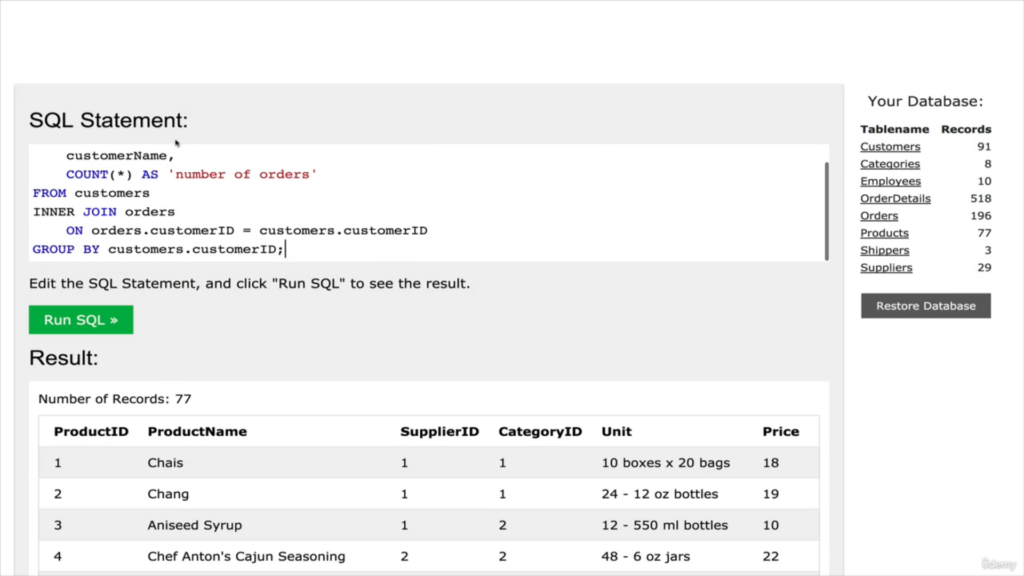
Overview:
An extremely comprehensive 20hr+ (he left the legacy data in there, so it say 37 hrs) SQL course that is a true beginner to expert course with hundreds of articles and quizzes, a fantastic introduction to SQL and database architecture plus meaning other great subjects. He’s also recently redone this course completely in December 2022. Here’s a list of what you’ll get to learn:
- String management (CHAR, UPPER, LOWER, REPLACE, SUBSTRING).
- Mathematical / aggregation functions (MIN, MAX, SUM, AVG).
- Breakdown of data types (FLOAT, DOUBLE, CURDATE, NOW).
- Logical functions / conditionals (AND, OR, LESS THAN, GREATER THAN and CASE)
- JOINS (inner, outer, self)
- Constraints and CRUD commands
- Working with DB in Node.js (NPM and Faker).
- Goes over views, modes and other concepts.
- Window functions
- Building a webapp with EJS templates (Node.js)
- Database triggers
Pros:
- This course is comprehensive. It has a great ramp-up from not knowing anything about SQL to being able to deploy your own web application VIA NodeJS while flexing your newly acquired SQL concepts.
- Ian Schoonover and Colt Steele are great teachers, well spoken and articulate even the smallest terms.
- A project!! The Instragram database is a great project, accompanied with a schema, hashtags and other coding problems.
- This is the first course I had actually seen that had a whole chapter on string manipulation. This is an extremely important concept in SQL, since data that’s entered into a DB may not always be the same and it usually will need to be transformed. String manipulation VIA SQL queries is one of those ways that you can make those changes.
- Almost 2 hours of logical operators which I use all the time when I’m running queries. The OR and AND statements are very popular in SQL.
- Three hours of join practice :). If you want a lot of practice doing JOINs (Inner, Outer, Self) and intersect + union, this is the course to take.
Glad to see a section on triggers and search refinement (LIKE, DISTINCT and WILD cards). For ad hoc queries, I love using LIKE or REGEXP. However, they tend to be bad for querying speed.
Cons:
- No user-defined functions chapter. This was strange to me because the course seemed like it could easily be set-up for it.
- It is 20 hours, so while that’s a lot of SQL – it’s longer than your average course.
- Sometimes, Colt and Ian’s interludes before the lessons seemed redundant so I found myself skipping them. This is due to my experience with SQL. If you have no experience, I can see them being a benefit to listen to.
Who this course is for
- People who want an in-depth understanding and experience in SQL. Colt and Ian do a great job giving plenty of SQL knowledge to a newbie.
- A business analyst or person who wants to start their journey in SQL.
- A software developer who wants to expand their SQL skills (understanding that you may want to skip the first half of the course).
- Someone who wants to build something end-to-end (starting with the very basics of SQL, and deploying an application that can run CRUD operations on a DB).
Who this course not for
- Someone who wants to learn NoSQL or SQL server. This course primarily focuses on MySQL.
- A senior engineer or database administrator – this course will be too easy for you.
Customers love Colt and Ian’s bootcamp! Here are some testimonials!
Excellent course. Colt was clear and the exercises were very helpful which was easy to follow. This is the best course to go with when you start to learn MySQL. Also, it is engaging andThe course is simply amazing, thanks to Colt. Even for a complete beginner the subject is made easy to understand and progresses along the way in an effective and timely manner. I spent about a month on the complete course and it’s very effective. interesting to see the cat, Blue in introduction of every section. Thank you so much, Colt
Christopher Dominic P.- 5 / 5 stars – August 2023
Great course, I really liked the way Colt explained everything within this course. I came into this course expecting nothing but to gain basic SQL skills however now I really feel like I can actually work with SQL without freaking out.
Sergio Martin Landaeta O. – 5 / 5 stars – August 2023
I like that the course has been updated to include the install and use of MySQL. I think it gives for a better experience and encourages learners to think about what else they can use SQL for as practice and projects. Colt is great teacher and made concepts easy to understand. I returned to finish this course after struggling to understand concepts (fr Google’s Data Analytics) that I had understood with Colt’s teachings previously. It’s a great refresher and highly recommended.
R E. – 5 / 5 stars – July 2023
Verdict:
Not surprised that Colt has created another awesome course, his web development course was also great. Overall, this course has lots of nuggets of information and lessons that you can easily take away. The NodeJS app + MySQL course project at the end was a really big treat, and I think that’s one of the biggest selling points of this course.
It allows you to build a real world application and understand the purpose of learning all of those queries and the syntax. Coupled with the fact that Colt and Ian have kept the course updated and this course may soon become the best SQL course on Udemy.
For now, it’s a runner-up to Jose’s SQL course. Ultimately, I think this course may be more comprehensive if Colt and Ian added user-defined functions, or maybe another project on how CMS’ interact with MySQL. If they added these two things this course would be truly magical in my opinion.
Check out the course in Udemy Now!
Best Data analytics and Business SQL Udemy Course by 365 Careers
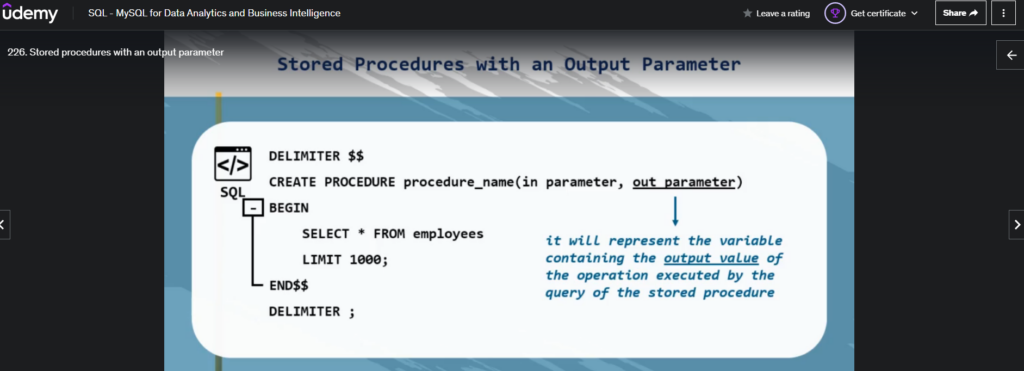
Overview:
Another great MySQL course which is geared towards analytics and business intelligence. This course has a Tableau integration chapter at the end. This is fantastic if you want to start to have a better understanding of BI and work with real tools companies use.
The course has the following breakdown:
- Tons of SQL theory, and foundational work (like how to set up a DB, how to load information into a DB).
- You use MySQL workbench to run the queries (which is a great GUI in my opinion).
- You’ll spend time breaking down constraints like foreign keys, primary keys and NOT NULL.
- Over 3 hours on SELECT, INSERT, UPDATE, DELETE, aggregate functions (COUNT(), SUM(), MIN(), MAX(), AVG()).
- JOINs
- Views
- Subqueries
- Stored routines
- Global / User defined variables and conditionals (CASE, AND, OR)
- Window functions
- CTEs
- Temporary tables
- Indexes and Triggers.
The course ends with about an hour of SQL and Tableau magic which is a great way to end the course (in practical usage of SQL).
Pros:
- Great progression and general overview of many different MySQL commands
- Good exercises and review of each chapter
- I love MySQL workbench, I’m happy 365careers showed me this because I still use it.
- Great Tableau project at the end of the course
- First course that actually brought up Data definition language (DDL), Data manipulation language (DML), Data control language (DCL) and TCL – Transaction control language.
- True to form, there’s a great segway in this course from spreadsheets into databases
- Finally someone brought up stored routines and parameters!
Cons:
- The sections were a little light. Views was only a 7 minute video, self-joins (8 minutes) and subqueries (17 minutes). All of these sections could be courses on their own!
- You only end up using Tableau public, which is a public open-source version of Tableau with limited features. Having used Tableau Desktop, the versions are very different.
- While the exercises were good, sometimes they were too similar to the actual lesson. This made the exercises too easy. However, the final section (which is basically a test) has great questions covering all of the course material.
- Since this is a business intelligence course, we could have benefited from learning other visualization tools like DOMO or Google data studio.
Who this course is for
- Someone looking to learn MySQL from scratch and begin to learn the data visualization tool Tableau
- A jr. data analyst or business analyst that needs to understand how to query from a data-set, and extract that data to visualize for business use.
- Anyone looking to have a great overview of MySQL, (this course touches on a lot of sections albeit very small sometimes).
Who this course not for
- A database administrator (DBA), or someone looking to become a DBA. This course may start you off in the right direction, but is not comprehensive enough.
- A web developer or someone looking to build applications, this course is geared towards BI and Excel usage, not the creation of applications.
See what some users say about this BI SQL course!
I have a good background in manipulating data and building interactive model in excel. To take this to the next level I needed SQL and this is a perfect course in getting me that SQL basics, knowledge and confidence with real life data sets. Thank you to the instructors for putting together such great course. Thank you and have a great day.
Bharath J. – 5 / 5 stars – August 2023
The course was well explained and covered every topic with code explanation for it. It was overall the best MySQL course for Data Analytics as it even covered advanced topics like Windows Function, Sub-Query.
Piyush K. – 5 / 5 stars – July 2023
Great course, I learned a lot of stuff that I had not seen in another course I took in Udemy, such as subqueries, views, stored routines, window functions, CTEs, and the extra quick videos about tableau. I like that I received replies to my questions. It is clear that the course has been updated, and there is some room for improvement on some queries and explanations, but it does not affect the general experience that is excellent. Super happy that I took this course, I recommend it.
Julian Martin D. – 4.5 / 5 stars – July 2023
Verdict
Another course I’ve done from start to finish! It was a great experience and allowed me to learn stored procedures and how to work with Tableau and MySQL. This course is high quality, while also being simple enough if you have no SQL skill. I’d recommend this course if you’re a business person trying to learn how to understand MySQL. While I would have liked to see some SQL server and an intro to Python or R, that’s definitely more of a data science thing.
Check out the course in Udemy Now!
Best SQL Udemy course with BigQuery and Google data studio – by Chris Levy.
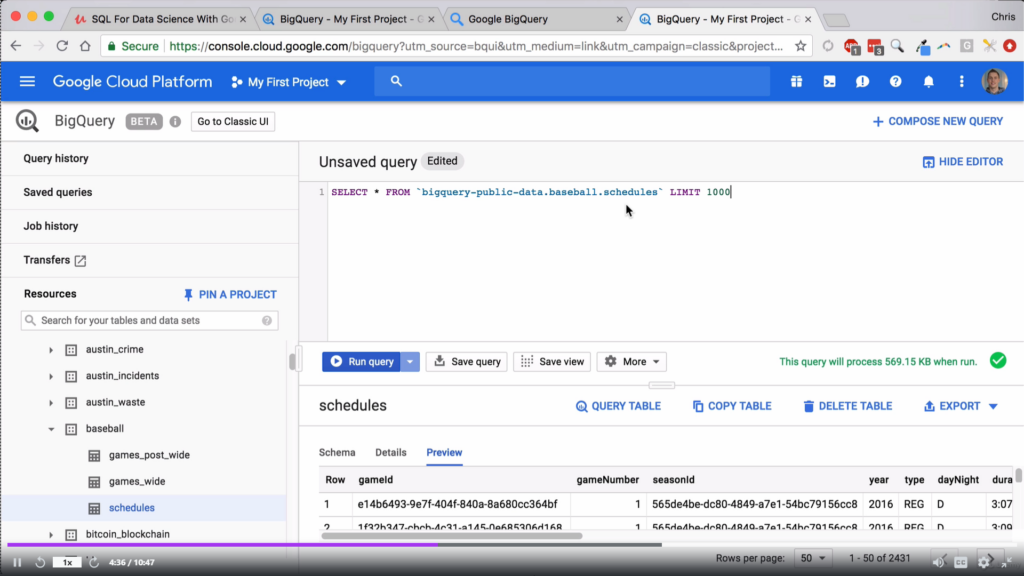
Overview:
Since it’s so popular and I have some experience with it, I figured that I would also throw in a BigQuery, Google analytics / Google data studio course as well! This course, created by Chris Levy, is a 7 hour course where you’ll learn generic SQL statements on Google BigQuery and then visualize them in Google data studio. The types of SQL commands you’ll learn are SELECT, WHERE, JOINS, Aggregate functions and CASE. You will also go over specific how BigQuery works with Cast, string and date + timestamp.
The course has two hands-on projects.
Pros:
- This course is a perfect length for what it’s supposed to provide. While it’s not a comprehensive deep dive in SQL, it gives you SQL understanding to work with BigQuery and build plus visualize your own information in Google data studio (GDS).
- The course has two hands-on projects; one is very in depth (build out your own dashboard),and the other is more of a walkthrough talkthrough.
- Chris is well spoken and easy to understand.
- The creation of the data studio dashboards is actually fun!
Cons:
- It’s not a full SQL course, so you may learn a few queries and how to run them – but without more practice you’ll be far from an expert in SQL
- DISCLAIMER – if you sign up for a Google cloud platform account, make sure to turn off the usage after you’re done the course, or GCP will charge you for having an operation Bigquery.
- The course is a little outdated, so it could definitely use an update.
Who is this course for:
- Someone looking to learn SQL for data science and to create some dashboards
- A digital marketing or digital analyst who is tech and wants to learn some neat skills
- A web developer who wants to broaden their skills and do some data visualization
Who is this course not for:
- Someone looking to learn SQL period – this course is more of a “SQL data science course”.
- Anyone pursuing the career of database administrator or architect
- Someone looking to purely go into Data science (you’ll need a ton of other tools like Matlab, Python, R).
What did students say about this Google data studio, BigQuery SQL course
Fantastic intro to Google BigQuery. I will be referencing back to this course a lot in my journey. Its well laid out and easy to understand, and i am from a finance background.
Ed D. – 5 / 5 stars – April 2023
i am a SQL beginner and this course suits me. Also the quiz are really effective.
Monika M. – 5 / 5 stars – July 2023
Sometimes the instructor does not make it clear about the problem statement that leads to the related query. I think the thought process and problem-solving approach is very important because it can help the learners to apply different query techniques in different situation effectively.
Thanh Thao N. – 4 / 5 stats – August 2023
Verdict:
A great little fun course that while out of date, can still provide valuable skills you need in this competitive landscape. I would say that if you want to get your feet wet with an easy data science course – I would highly recommend this course as a starting point. If you’re looking for something more comprehensive in data science, consider an ML course like Kirill’s Hands-on python & R in Data science or a straight-up data science bootcamp.
Check out the course in Udemy Now!
Best Udemy Course for PostgreSQL by Stephen Grider
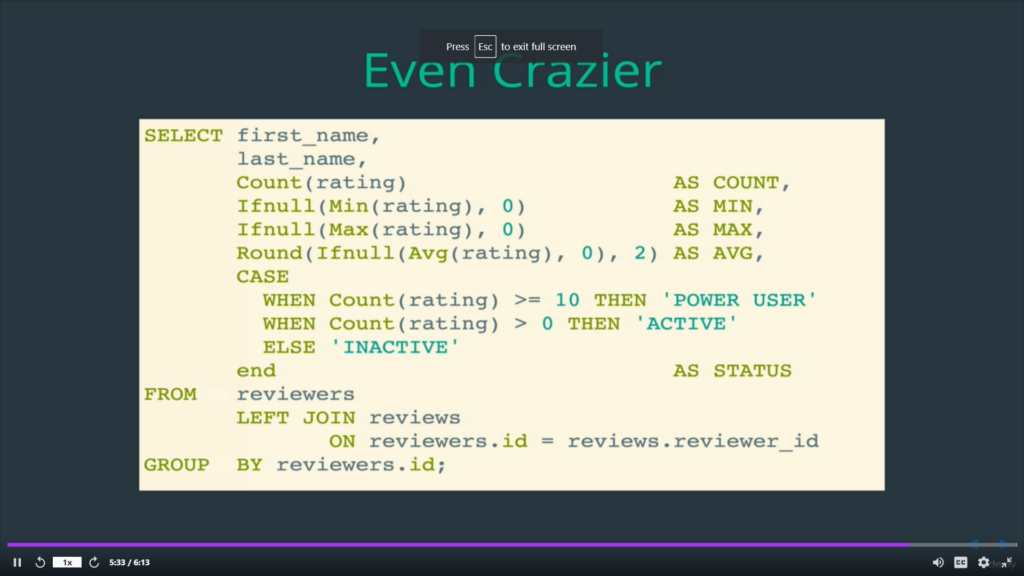
Overview:
This 22 hour long PostgreSQL course is built differently than the rest of courses mentioned in this SQL guide. The course does the following:
- A 40 minute introduction on how SQL works and what it does
- How to work with tables – CREATE, DELETE, UPDATE, DELETE (CRUD)
- JOINS, Aggregate, manipulating large data-sets and then a small lesson on Sorting (order by, group by)
- Unions and intersections
- Almost 2 hours of subqueries!
So this course starts with roughly 6 hours of learning. Then the course looks at how to theoretically build a “Mention”, “Hashtag ” and “Follower” which are all important to creating a strong database infrastructure.
The course then dives into more advanced stuff like indexes, common table expressions, recursive table expressions, views, database schemas and even working with APIs in Postgresql. The course finishes off with security around Postgresql and parallel testing (both I have no practical information about).
Pros:
- This is a comprehensive course, and touches a little bit of everything that you need to know about SQL.
- It’s great that there’s a ton of strategy and infrastructure planning in this course + the practical skill of querying.
- 2 hours of subqueries – better than some entire courses.
- 1 hour of indexes – this is amazing!
- It was neat to learn about parallel testing so that you can test how fast the queries run side by side. This is so that you can optimize their speed.
- Stephen Grider is a great teacher, well spoken and methodical.
- Course has been recently updated (March 2022).
- You’ll learn how to use PGadmin an interface use to interact with Postgresql.
Cons:
- It is a long course in the way of SQL, and while there are over 20 coding exercises, there’s actually a fair bit of less hands-on work.
- Honestly, I was a bit shocked that there were no stored procedures or user-defined functions. This course touches on literally everything else!
Who is this course for:
- Someone who wants to learn SQL pretty well, this is a great course specifically on Postgresql.
- A person looking to dive straight into Postgresql without any development skills.
- Anyone looking to get into Python development (It uses Postgresql)
Who is this course not for:
A senior engineer or programmer.
What do the learners of Stephen’s course think about it?
the explanation is very good, easy to understand. It also quite comprehensive but it will be better if you add materials about administration user
Totally worth it!
Ahmat F. – 5 / 5 stars – September 2023
Quite possibly the platonic ideal of a course on SQL. Hardly a single wasted moment; no confusion or things not working as expected; clear and succinct. Elegant parsimony that only enhances the student’s understanding. Kudos, bravos, roses, and untold riches to the instructor.
SELECT * FROM courses WHERE course_name = ‘SQL and PostgreSQL: The Complete Developer’s Guide’;
James B. – 5 / 5 stars – April 2022
I absolutely loved this course! This course proved to be incredibly beginner-friendly. The instructor’s teaching style is fantastic — they break down complex concepts into easily digestible segments. What truly impressed me were the clear and concise visual representations used throughout the videos. This visual approach helped me grasp the material better, as I could see exactly what was happening and understand the reasoning behind it.
Adhem K. – 5 / 5 stars – September 2023
Verdict:
This is a great course, and I think after some of the web development courses I have lined up from my previous article, I might actually get to finishing this one. The ratings are high for this course, it’s well structured and it’s all about SQL.
Check out the course in Udemy Now!
Best NoSQL / MongoDB course on Udemy by Maximilian Schwarzmuller
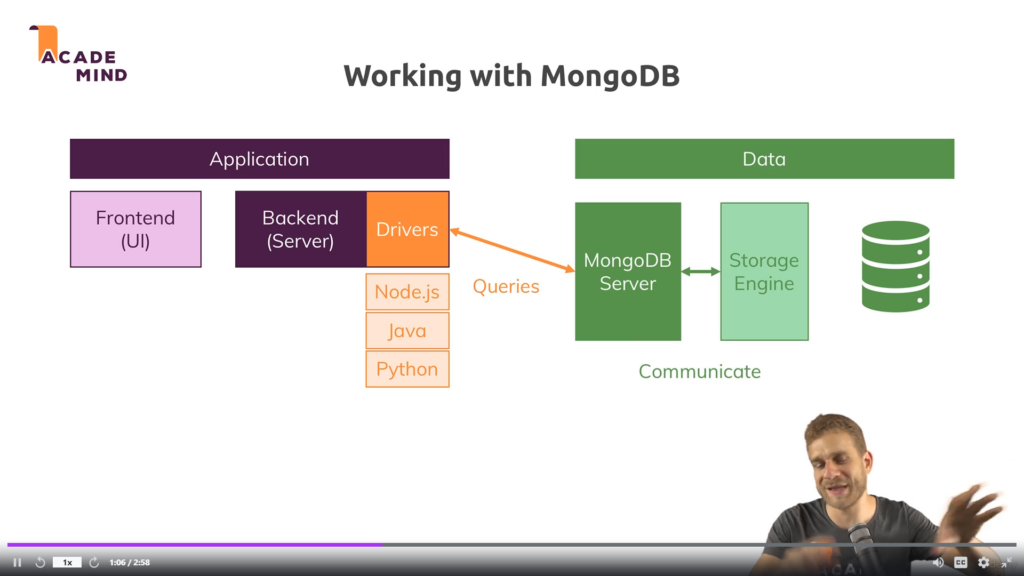
Overview:
MongoDB, a derivative of noSQL, is a newish (first coined in 1998, with MongoDB coming out in 2007), framework that is meant to be lightweight, more nimble and easier to use than other relational databases (rdbms) like MySQL and SQL server. That being said, the syntax is very similar to other SQL frameworks, so the transference of knowledge on MongoDB vs. any other relational DB should be quick.
You’ll look at the following:
- How to use JSON and BSON for MongoDB
- Working with arrays and embedded objects.
- Create, Read, Update, Delete (CRUD) in MongoDB
- Schema and relationships in MongoDB
- Data types
- Indexes
- MongoDB Compass
- Shell usage in MongoDB (Config file)
- Aggregation Framework
- Security in MongoDB
- Deployment, Transactions and an introduction to Stitch (an SDK that allows secure transference of data).
Pros:
- Lots of MongoDB knowledge, holy cow. I plan on diving deep into MERN and Ruby On Rails (which uses SQLite) after I finish my PMP and I haven’t seen such a comprehensive noSQL course on Udemy to date!
- You’ll learn how to use MongoDB atlas, which is a great tool if you’re doing cloud administration.
- There’s also a quick crash course on Stitch
- It’s taught by Maximilian who has dozens of other courses on Udemy and is a fantastic teacher.
Cons:
- So, this isn’t an “SQL” course per se. NoSQL does function quite differently than other SQL languages despite sharing some similarities. Ultimately, because they function so differently – you may find yourself needing to take other SQL courses to compensate for the lack of actual querying.
- There was only 4 hours of actual querying in normal SQL syntax, the rest of the training was specifically meant to actualize, deploy and work with configurations for MongoDB.
- Why isn’t there more information on how MongoDB interacts with React!!
- There’s nothing talking about Mongoose, which is a popular framework to deploy MongoDB and JS applications.
Who is this course for:
- Someone looking to learn MongoDB
- Someone who wants to learn NoSQL or polish their NoSQL skills
- A web developer or data scientist who wants to learn how NoSQL or MongoDB works
Who is this course not for:
- Not meant for someone looking to do DB administration of MongoDB servers
- A beginner or someone who has no technical knowledge / experience. This course gets pretty detailed when it comes to Stitch and other fancy tools. If you’ve never ran a query or done bash, it may be difficult for you to keep up.
- Someone looking to integrate their React application or someone looking to learn about Mongoose.
What do these NoSQLs customers think of the course?
Brilliant course, could last 2 sections be updated please. Apart from that very solid course))
Aleksandr S. – 4.5 / 5 stars – August 2023
It’s amazing. Overall I learn a lot of concepts which are helpful in diverse projects. I liked intermediate assignment concept which makes revision of your learnings through videos.
Pranav P. – 5 / 5 stars – July 2023
It’s a good course for sure. The course content was presented in a clear and structured manner, making it easy to follow along and understand the concepts. The delivery style of the instructor was engaging and kept me interested throughout the course. Keep up the good work!
Saurabh B. – 4.5 / 5 stars – August 2023
Verdict:
Great course if you’re looking to learn NoSQL or MongoDB, not the best course if you’re looking specifically to learn MySQL or another database management system. If this course had something outlining Mongoose or focused more on React, it may be a little more relatable to development folks. However, this is a solid course and has already been added to my wishlist of things.
Check out the course in Udemy Now!
Best Oracle SQL course – The Oracle Bootcamp course by Oracle Master
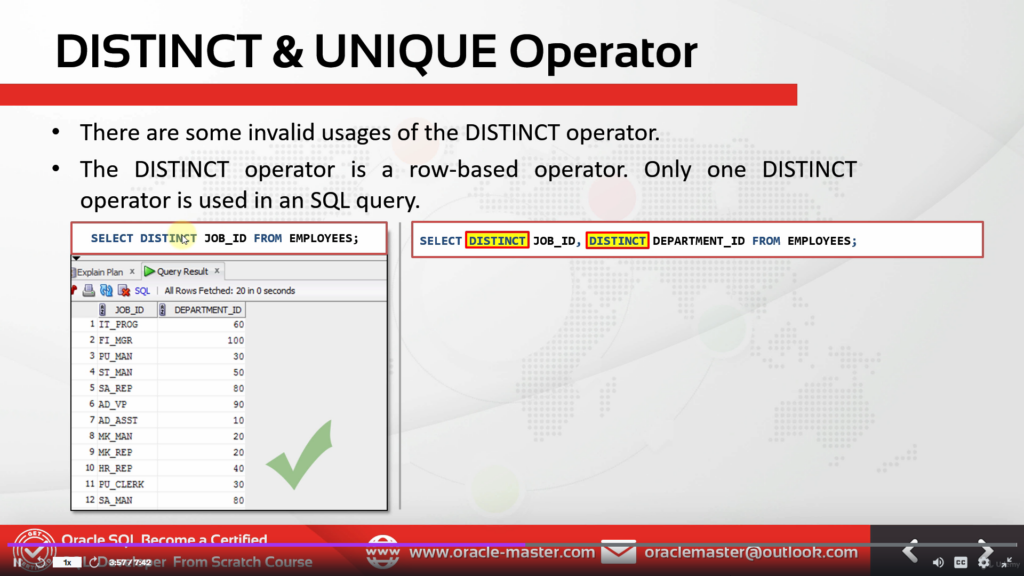
Overview:
A 32 hour course with tons of download resources, hands on learning on SQL server, quizzes and an instructor with Oracle real world experience, Oracle Master Training provides an up-to-date Oracle SQL course for those looking to master a more distinct SQL variation. Some of the highlights of this course are:
- Substitution variables
- Conditional Expressions
- Grouping Data
- Joins
- Subqueries
- SET
- DDL and DML statements
- Viws
- Sequences and Synomyns
This course rounds out with how to install your own oracle 12c instance on your computer and an SQL cheat sheet for the Oracle 1Z0-071 database certification. It also has hundreds of practice questions shaped like the exam. Ultimately, this course was designed to help you pass this Oracle exam.
Pros:
- A lot of SQL practice in this course, since it’s prepping you for the exam, longest one on my list
- Some of these chapters are so in-depth, which makes it good.
- Great course updates provided by the author
- You really don’t need previous programming experience, this course is full service for noobs.
- There’s practice exam questions for the exam (200+ quality questions)
Cons:
- This is a lot of SQL, if you’re not aiming for the Oracle certification, I don’t know if it’s worth it.
- The instructor has a slight accent, which may make it hard to understand him for non-native English speakers
- Since the course is so long, it can be pretty boring.
What did these Oracle students say about the course?
Awesome! I learnt a great deal and my confidence level has increased, thanks for this amazing course.
Promise U. – September 2023 – 5 / 5 stars
This course is great and easy to follow. The instructor gave us explanations with real examples. If you are new and want to build a good foundation for your SQL knowledge, you can apply to this course.
Hung Le Ngoc. – September 2023 – 5 / 5 stars
Verdict on this Oracle SQL course
This course is highly praised on Udemy as one of the best Oracle SQL courses of all time. One part due to it’s thorough analysis of Oracle SQL, and another part due to the fact that it prepares you for an Oracle certificate, which is highly regarded in the development community. However, beware of this course if you’re just looking to learn some Oracle SQL, this is a pretty long and tedious course – comparable to some of the OOP bootcamps on Udemy.
To summarize, grab it if you’re taking the certification course – if not maybe opt for a shorter course to learn Oracle SQL.
Level up your Oracle SQL skills now on Udemy
Conclusion
Here are the top 7 SQL courses on Udemy.
- Best SQL bootcamp by Jose Portilla
- Runner up Best SQL boot camp by Colt Steele and Ian Schoonover
- Best for MySQL and Business Intelligence by 365 Careers
- Best SQL Udemy course with BigQuery and Google data studio by Chris Levy
- Best Udemy Course for PostgreSQL by Stephen Grider
- Best NoSQL MongoDB on Udemy by Maximilian Schwarzmuller
- Best Oracle SQL bootcamp course by Oracle Master
Note :a quick shoutout to Brewster Knowlton’s Microsoft SQL for Beginners course which teaches SQL Server and T-SQL. This framework (SQL server) is becoming a little less popular, but this course seemed great for what it’s teaching. It’s only four hours, so you can probably take it within one weekend if you want.
I hope you’ve enjoyed this article I’ve put together for you. The purpose of it was to provide you with a number of modern SQL courses on Udemy so you could grow your skills. SQL by itself isn’t all that useful since it’s used to interact with the data. So unless you’re planning on being a database administrator or architect, it’s likely that SQL is a skill you need in your comprehensive engineering tool kit. Whether you’re a web developer, business analyst, project manager or even a marketer – you may need SQL in your career, and Udemy is a great way to learn, polish and broaden that skill.
Let me know if there’s anything I missed in the comments!
FAQs
Although the courses are good on Udemy, comprehensive with a ton of theoretical and practical SQL tutorials, you can’t master SQL solely by learning it on a tool like Udemy. You need to run queries, work with production data in the real world. Udemy gives you a strong introduction to how SQL works – it’s up to you to master the language.
There are very basic free SQL courses that will provide some practice and theory – but they won’t provide the same level of learning as a paid course. Learning a programming language is not easy, it takes dedication and hundreds if not thousands of hours of work. These free courses just can’t provide that.
If you only take Udemy courses and apply for a job to become an SQL developer, I almost guarantee you that you won’t even make it to the screening interview. Most positions require years of experience and with that, real-world data manipulation. You may have a good understanding of normalization, but if you’ve never done it in a production environment before – you’ll likely struggle to figure out solution when confronted with that issue.
Ultimately, I think Udemy shines in covering a wide range of topics which can help you to begin to be knowledgeable about a subject. I also find that because you can so easily consume Udemy courses, it makes it an invaluable tool to ace interview questions.
Like any language, SQL takes time to learn and master. While it may take you a few days to grasp basic concepts like JOINs, UNIONs, Advanced SELECTs, it could take years for you to be able to complete construct a database effectively. You can never truly master SQL, since it’s always evolving and changing like the world of tech. If you have a goal to learn SQL, I would ask why you’re looking to learn it. A database administrator will be much more fluent than a reporting analyst working in Google BigQuery.
As an engineer, reporting analyst or data scientist – I would say it’s worth learning SQL. You’ll be working with large datasets and databases that will need to be extracted, transformed and loaded (ETL) in many different ways. If you’re a business person, you may not need to know how to run the queries – but understand how querying works.
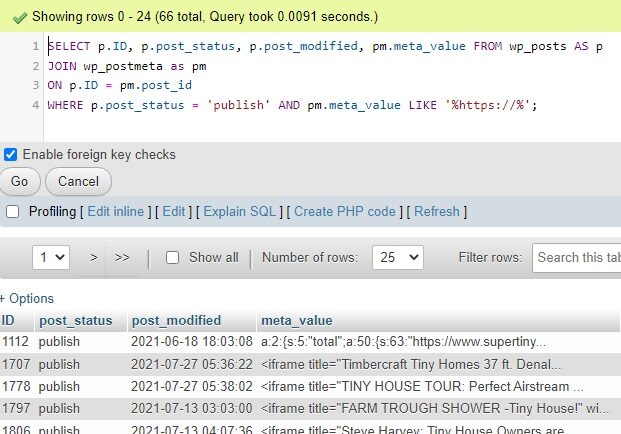
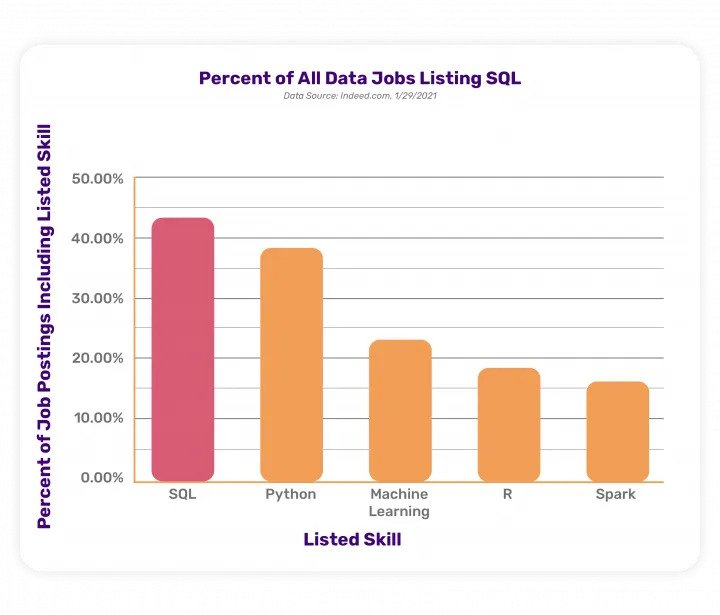
Thank you so much for providing this valuable information. Courses and training will definitely be helpful for gaining deeper knowledge in this area. Unified Mentor is an online learning platform that offers user-friendly certification courses as well as training. Learn and excel in your chosen field with ease. I hope you will like our platform and courses.